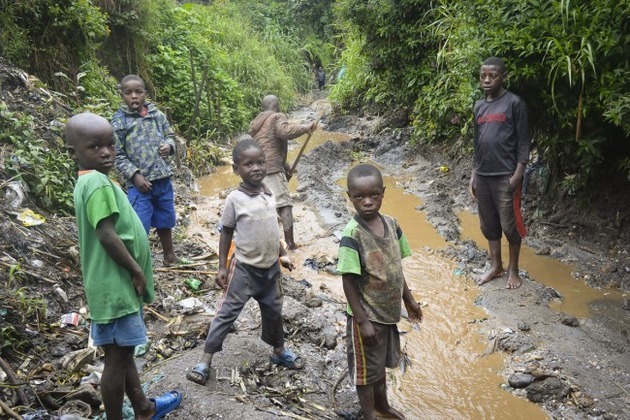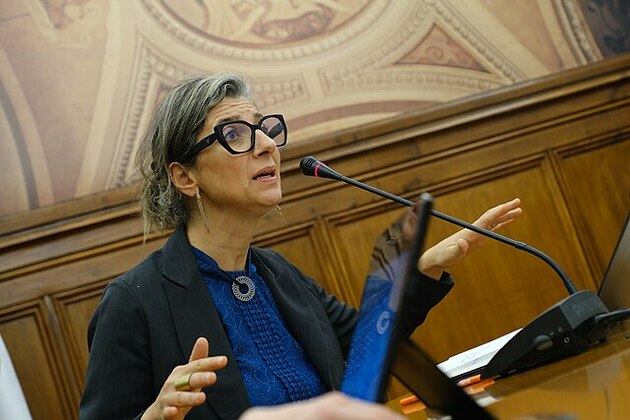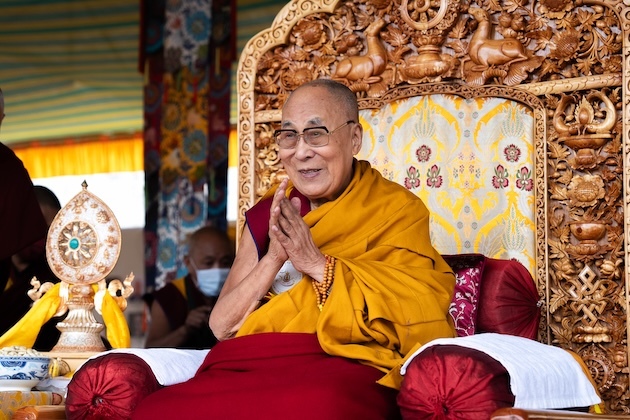In Mineral-Rich DRC, Widespread Poverty Is Driving Children to Work in, Near Mines
Global Press Journal by Noella Nyirabihogo
28 Nov 2016, 16:34 GMT+10

Here, much of the world's deposits of coltan, used in modern electronics, and cassiterite, the main ore of tin, await excavation by tiny hands.
Barefoot children and teens wade through the dirty water that flows from the hills here, spades and amateur mining tools in hand, on their way to and from their informal workplaces downhill from the mines.
Boys dig for minerals, including coltan, in Democratic Republic of Congo's Rubaya zone, where much of the country's mining is done. They use the money they earn to buy food, clothes and shoes.
Noella Nyirabihogo, GJP DRC
Despite the immense mineral wealth in DRC, people here live in endemic poverty. In Rubaya, a powerful evidence of that poverty is the large number of young children who have dropped out of school or who have fended for themselves from an early age.
A 2009 law prohibits all forms of economic exploitation of any person under 18 years of age, and some of the larger mines have removed children from their sites to comply with that law, even as they declined to confirm there were children working at the sites. In addition to the DRC's law, the International Labour Organization states that mining is one of the worst forms of child labor, calling it a "work which, by its nature or the circumstances in which it is carried out, is likely to harm the health, safety or morals of children."
Still, there are 168 million children worldwide trapped in child labor. According to the ILO'S World Report on Child Labor 2015, since 2011, DRC is one of the 108 countries in the world and 28 countries in Africa in which children work in hazardous jobs.
Artisanal mining, also known as small-scale or subsistence mining, is unregulated in many countries, including DRC. Of the up to 2 million people in DRC estimated to engage in artisanal mining, some 40 percent are said to be children.
"It's not a secret that some owners of mining sites choose to have cheap labor, which is the main reason for the presence and work of children in mines in DRC," said Janvier Murairi Bakihanaye, president of Association pour le Developpement des Initiatives Paysannes (ASSODIP) and one of DRC's leading human rights researchers. "Children are also considered useful for underground work in tooling supply, replacement lamps and bringing various materials and food to miners."
In August, Human Rights First, a nonprofit advocacy group, awarded Murairi a Medal of Liberty for his work to combat slavery in DRC's mining sector.
"Children must work to contribute to the survival of the family even if the work may harm them mentally, physically and emotionally," he says. "The salary of the children, so thin it may be, is an important part of the income of poor families."
In Rubaya, the high demand for coltan and the siren call of lucrative pay coaxes children out of school.
Coltan, the abbreviation for columbite-tantalite, is a radioactive ore known for its hardness and extreme resistance to heat and corrosion, making it a key component in many electronics (including cell phones and computers), smart bombs and aerospace technology. DRC produces nearly half the world's tantalum, which is extracted from coltan.
Increased awareness about the dangers children face in the mining sectors has led to what Murairi calls a "significant decrease" in the number of children working in the formal mines.
But there are countless other ways for children to engage in the mining sector without being formally employed by a mine.
When raw minerals are extracted, it's often children who carry them to the river to be washed and dried. The children are paid nominal fees for those tasks.
Even though they are not formal employees of a mine, it's illegal to pay children for these tasks or buy minerals the children find in the puddles below the mines, Murairi says.
"All this is prohibited under local, national and international initiatives," he says. "Children should not engage anywhere in the mineral supply chain."
Local authorities have sanctioned and fined some parents, but advocates say that punishing parents won't get to the root of problem: poverty.
Shangwe Fazili says it's difficult to dissuade his 12-year-old boy from washing and selling coltan.
"Our children are accustomed to working in the mines. They go there on their own accord and are also used to earning money," he says. "It is a freedom they hold dear to their hearts."
Fazili is a carpenter in Rubaya. He says he earns the equivalent of about $5 per day when he is fortunate enough to get a client, but sometimes he returns home empty-handed.
"With my job, I cannot afford to buy even pants or shoes for my children, because all the money I earn is used for food," he says. "So how can I prohibit them from working as I have nothing to offer them?"
Local leaders say they try to keep children from the mine.
"Children working in mines do it without our knowledge, and whenever we become aware of such illegal practice, we intervene to put an end to it," says Serkali Birhalo, a village leader in Rubaya.
For Fazili, the solution is not to prevent parents from sending their children to the mines or punish parents who can't keep their kids from working there. Instead, he says, efforts need to be made to address poverty.
"The problem is not preventing children from working, but the real problem has to do with the harsh living conditions of parents which force children into labor," Fazili says.
Until poverty is alleviated, local people say, children will pan, wash and dry minerals throughout Rubaya.
"I have clients," Philemon, the 15-year-old miner, says proudly. "And there are always people inclined to buy my coltan."
Philemon's experience in the trade is evident as he roots through the sand. He skillfully pulls coltan from the sandy puddle in front of him. Once he collects a few grams, he goes off to sell his findings to established clients.
He says that even though coltan pulled from outside of the quarries can be of lower quality, there are still plenty of willing buyers.
Philemon uses his earnings to buy shoes and notebooks. Most of all, he says, earning money helps him feel useful. He's proud when he can buy ndazi, a local type of donut, and musururu, the local sorghum drink that is a form of beer.
Many children look for informal work at the mine before they even reach their teen years.
Bosco, who asked that his last name not be used, in order to avoid trouble for his family, has just turned 15. He dropped out of school when he was 9 and has worked in the coltan mine sector ever since.
"After my mother's death, I was obliged to take care of my three brothers because my father could not do it alone, so I started to follow others, whenever they were leaving for the mines, without my father's knowledge," he says. "Sometimes they could allow [or] refuse to allow me to work. It all depended on the person in charge."
When Bosco is not in the mines, he spends his day searching for coltan in small streams at the foot of the hills.
"Even if one cannot earn more money unless they work in the mines, I earn at least [the equivalent of] $2 whenever I come to this place," he says.
Sylvestre Ndahayo translated this article from French. Share
Share
 Tweet
Tweet
 Share
Share
 Flip
Flip
 Email
Email
Watch latest videos
Subscribe and Follow
Get a daily dose of New Jersey Telegraph news through our daily email, its complimentary and keeps you fully up to date with world and business news as well.
News RELEASES
Publish news of your business, community or sports group, personnel appointments, major event and more by submitting a news release to New Jersey Telegraph.
More InformationBusiness
SectionStandard and Poor's 500 and and Nasdaq Composite close at record highs
NEW YORK, New York -U.S. stock markets closed with broad gains on Thursday, led by strong performances in U.S. tech stocks, while European...
Persson family steps up H&M share purchases, sparks buyout talk
LONDON/STOCKHOLM: The Persson family is ramping up its investment in the H&M fashion empire, fueling renewed speculation about a potential...
L'Oreal to buy Color Wow, boosts premium haircare portfolio
PARIS, France: L'Oréal is making a fresh play in the booming premium haircare segment with a new acquisition. The French beauty conglomerate...
Robinhood launches stock tokens for EU investors, adds OpenAI
MENLO PARK, California: Robinhood is giving European investors a new way to tap into America's most prominent tech names — without...
Wall Street diverges, but techs advance Wednesday
NEW YORK, New York - U.S. stocks diverged on Wednesday for the second day in a row. The Standard and Poor's 500 hit a new all-time...
Greenback slides amid tax bill fears, trade deal uncertainty
NEW YORK CITY, New York: The U.S. dollar continues to lose ground, weighed down by growing concerns over Washington's fiscal outlook...
International
SectionOver 60 companies named in UN report on Israel-Gaza conflict
GENEVA, Switzerland: A new United Nations report alleges that dozens of global corporations are profiting from and helping sustain...
UK lawmakers desigate protest group as terrorist organization
LONDON, UK - Lawmakers in the United Kingdom have voted overwhelmingly to proscribe the direct-action group Palestine Action as a terrorist...
Dalai Lama to address Buddhist conference, reveal succession plan
DHARAMSHALA, India: The Dalai Lama is set to address a significant three-day conference of Buddhist leaders this week, coinciding with...
US Supreme Court backs Texas efforts to shield minors online
WASHINGTON, D.C.: In a significant ruling last week, the U.S. Supreme Court upheld a Texas law requiring age verification for users...
Turkey, France battle wildfires amid early Europe heatwave
ISTANBUL/PARIS/BRUSSELS: As searing temperatures blanket much of Europe, wildfires are erupting and evacuation orders are being issued...
Venetians protest Bezos wedding with march through the town
VENICE, Italy: Over the weekend, hundreds of protesters marched through the narrow streets of Venice to voice their opposition to billionaire...













